Entrepreneurship and Small Business Management Venture Analysis
VerifiedAdded on 2020/10/22
|22
|7080
|228
Report
AI Summary
This report provides a comprehensive analysis of entrepreneurship and small business management. It begins by examining different types of entrepreneurial ventures, including scalable startups, small businesses, large corporations, and social entrepreneurship, and their relationship with the typology of entrepreneurship (survival, lifestyle, managed growth, and aggressive growth ventures), highlighting similarities and differences between these ventures. The report then interprets data and statistics to illustrate the impact of micro and small businesses on the economy, emphasizing their role in job creation and economic development, and discusses the potential contribution of small businesses to the growth of the social economy after Brexit. Furthermore, it explores the characteristics, traits, and skills of successful entrepreneurs, and examines how background and experience can both foster and hinder entrepreneurial performance. The report concludes by considering different environments that promote or impede entrepreneurship.

ENTREPRENEURSHIP
AND SMALL BUSINESS
MANAGEMENT
AND SMALL BUSINESS
MANAGEMENT
Paraphrase This Document
Need a fresh take? Get an instant paraphrase of this document with our AI Paraphraser
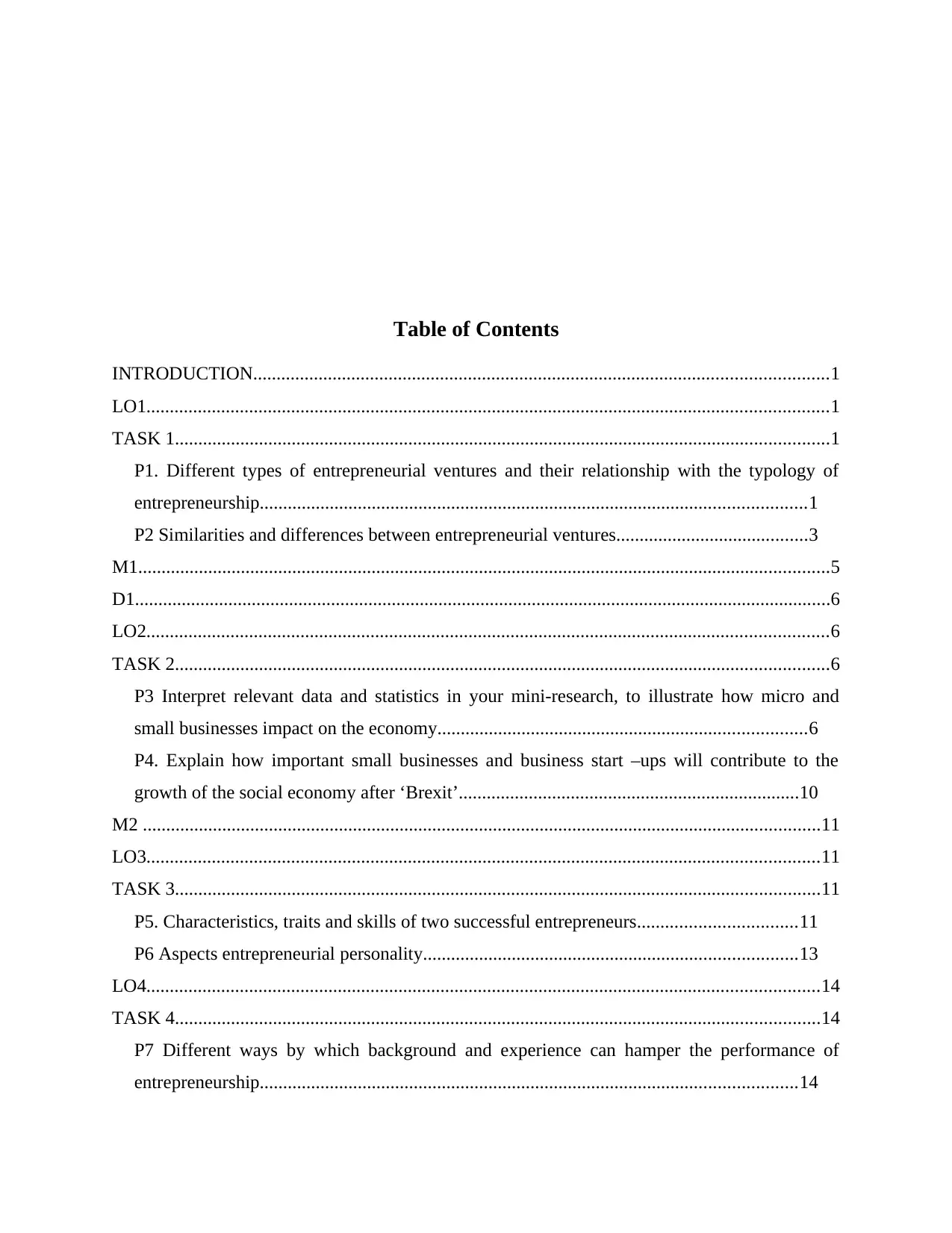
Table of Contents
INTRODUCTION...........................................................................................................................1
LO1..................................................................................................................................................1
TASK 1............................................................................................................................................1
P1. Different types of entrepreneurial ventures and their relationship with the typology of
entrepreneurship.....................................................................................................................1
P2 Similarities and differences between entrepreneurial ventures.........................................3
M1....................................................................................................................................................5
D1.....................................................................................................................................................6
LO2..................................................................................................................................................6
TASK 2............................................................................................................................................6
P3 Interpret relevant data and statistics in your mini-research, to illustrate how micro and
small businesses impact on the economy...............................................................................6
P4. Explain how important small businesses and business start –ups will contribute to the
growth of the social economy after ‘Brexit’.........................................................................10
M2 .................................................................................................................................................11
LO3................................................................................................................................................11
TASK 3..........................................................................................................................................11
P5. Characteristics, traits and skills of two successful entrepreneurs..................................11
P6 Aspects entrepreneurial personality................................................................................13
LO4................................................................................................................................................14
TASK 4..........................................................................................................................................14
P7 Different ways by which background and experience can hamper the performance of
entrepreneurship...................................................................................................................14
INTRODUCTION...........................................................................................................................1
LO1..................................................................................................................................................1
TASK 1............................................................................................................................................1
P1. Different types of entrepreneurial ventures and their relationship with the typology of
entrepreneurship.....................................................................................................................1
P2 Similarities and differences between entrepreneurial ventures.........................................3
M1....................................................................................................................................................5
D1.....................................................................................................................................................6
LO2..................................................................................................................................................6
TASK 2............................................................................................................................................6
P3 Interpret relevant data and statistics in your mini-research, to illustrate how micro and
small businesses impact on the economy...............................................................................6
P4. Explain how important small businesses and business start –ups will contribute to the
growth of the social economy after ‘Brexit’.........................................................................10
M2 .................................................................................................................................................11
LO3................................................................................................................................................11
TASK 3..........................................................................................................................................11
P5. Characteristics, traits and skills of two successful entrepreneurs..................................11
P6 Aspects entrepreneurial personality................................................................................13
LO4................................................................................................................................................14
TASK 4..........................................................................................................................................14
P7 Different ways by which background and experience can hamper the performance of
entrepreneurship...................................................................................................................14

Examination of different environments that foster or hinder entrepreneurship...................15
CONCLUSION..............................................................................................................................15
REFERENCES..............................................................................................................................17
CONCLUSION..............................................................................................................................15
REFERENCES..............................................................................................................................17
⊘ This is a preview!⊘
Do you want full access?
Subscribe today to unlock all pages.

Trusted by 1+ million students worldwide
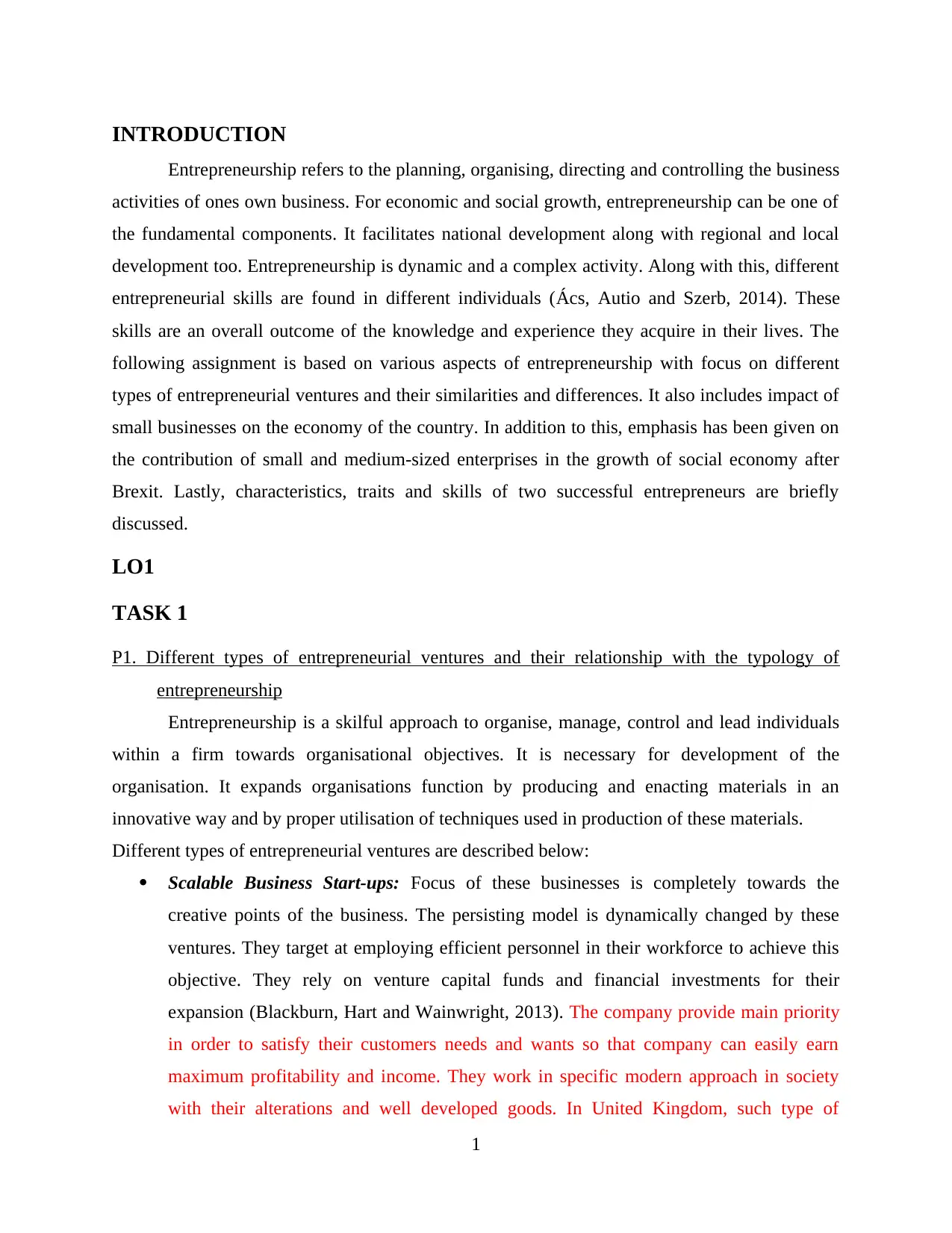
INTRODUCTION
Entrepreneurship refers to the planning, organising, directing and controlling the business
activities of ones own business. For economic and social growth, entrepreneurship can be one of
the fundamental components. It facilitates national development along with regional and local
development too. Entrepreneurship is dynamic and a complex activity. Along with this, different
entrepreneurial skills are found in different individuals (Ács, Autio and Szerb, 2014). These
skills are an overall outcome of the knowledge and experience they acquire in their lives. The
following assignment is based on various aspects of entrepreneurship with focus on different
types of entrepreneurial ventures and their similarities and differences. It also includes impact of
small businesses on the economy of the country. In addition to this, emphasis has been given on
the contribution of small and medium-sized enterprises in the growth of social economy after
Brexit. Lastly, characteristics, traits and skills of two successful entrepreneurs are briefly
discussed.
LO1
TASK 1
P1. Different types of entrepreneurial ventures and their relationship with the typology of
entrepreneurship
Entrepreneurship is a skilful approach to organise, manage, control and lead individuals
within a firm towards organisational objectives. It is necessary for development of the
organisation. It expands organisations function by producing and enacting materials in an
innovative way and by proper utilisation of techniques used in production of these materials.
Different types of entrepreneurial ventures are described below:
Scalable Business Start-ups: Focus of these businesses is completely towards the
creative points of the business. The persisting model is dynamically changed by these
ventures. They target at employing efficient personnel in their workforce to achieve this
objective. They rely on venture capital funds and financial investments for their
expansion (Blackburn, Hart and Wainwright, 2013). The company provide main priority
in order to satisfy their customers needs and wants so that company can easily earn
maximum profitability and income. They work in specific modern approach in society
with their alterations and well developed goods. In United Kingdom, such type of
1
Entrepreneurship refers to the planning, organising, directing and controlling the business
activities of ones own business. For economic and social growth, entrepreneurship can be one of
the fundamental components. It facilitates national development along with regional and local
development too. Entrepreneurship is dynamic and a complex activity. Along with this, different
entrepreneurial skills are found in different individuals (Ács, Autio and Szerb, 2014). These
skills are an overall outcome of the knowledge and experience they acquire in their lives. The
following assignment is based on various aspects of entrepreneurship with focus on different
types of entrepreneurial ventures and their similarities and differences. It also includes impact of
small businesses on the economy of the country. In addition to this, emphasis has been given on
the contribution of small and medium-sized enterprises in the growth of social economy after
Brexit. Lastly, characteristics, traits and skills of two successful entrepreneurs are briefly
discussed.
LO1
TASK 1
P1. Different types of entrepreneurial ventures and their relationship with the typology of
entrepreneurship
Entrepreneurship is a skilful approach to organise, manage, control and lead individuals
within a firm towards organisational objectives. It is necessary for development of the
organisation. It expands organisations function by producing and enacting materials in an
innovative way and by proper utilisation of techniques used in production of these materials.
Different types of entrepreneurial ventures are described below:
Scalable Business Start-ups: Focus of these businesses is completely towards the
creative points of the business. The persisting model is dynamically changed by these
ventures. They target at employing efficient personnel in their workforce to achieve this
objective. They rely on venture capital funds and financial investments for their
expansion (Blackburn, Hart and Wainwright, 2013). The company provide main priority
in order to satisfy their customers needs and wants so that company can easily earn
maximum profitability and income. They work in specific modern approach in society
with their alterations and well developed goods. In United Kingdom, such type of
1
Paraphrase This Document
Need a fresh take? Get an instant paraphrase of this document with our AI Paraphraser
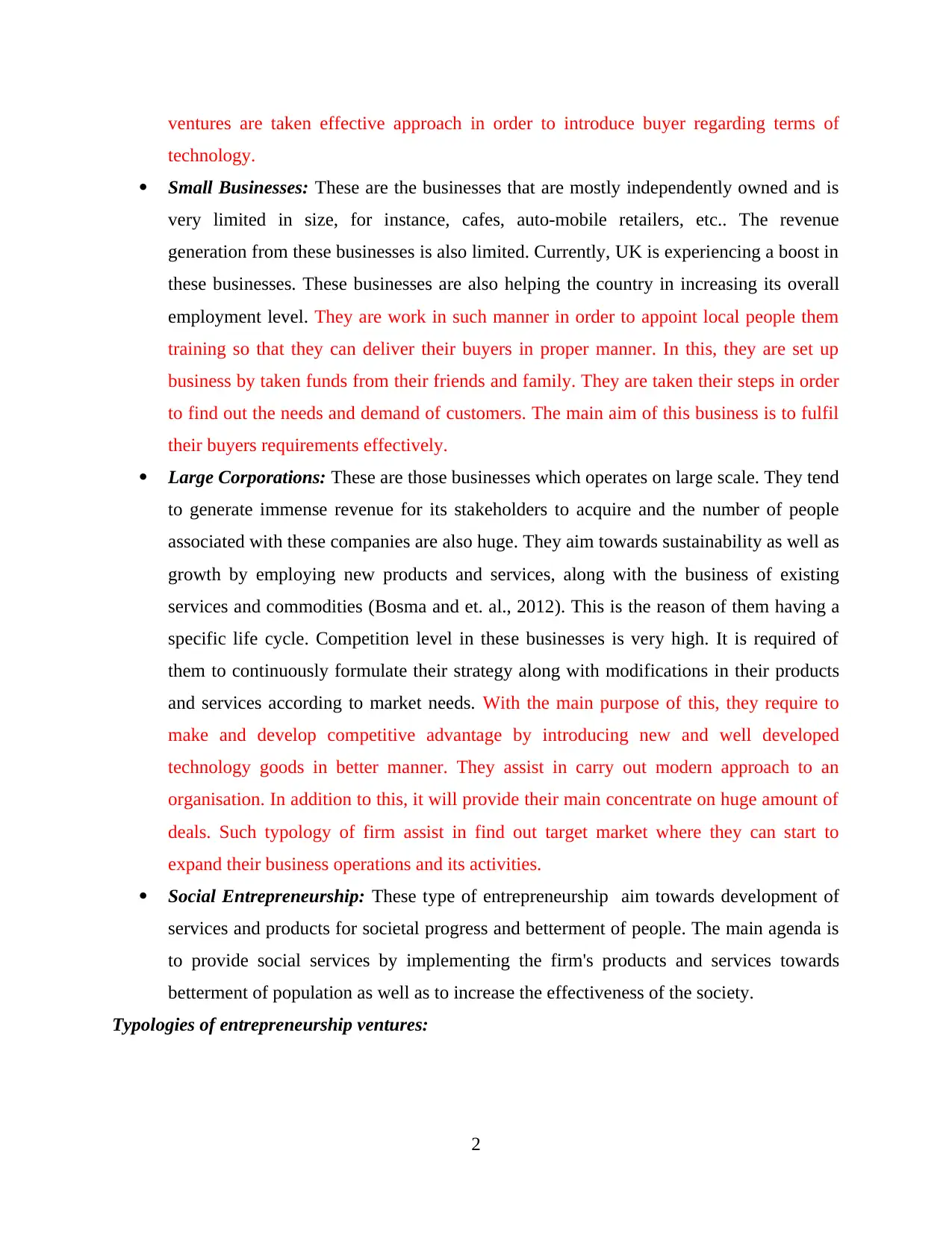
ventures are taken effective approach in order to introduce buyer regarding terms of
technology.
Small Businesses: These are the businesses that are mostly independently owned and is
very limited in size, for instance, cafes, auto-mobile retailers, etc.. The revenue
generation from these businesses is also limited. Currently, UK is experiencing a boost in
these businesses. These businesses are also helping the country in increasing its overall
employment level. They are work in such manner in order to appoint local people them
training so that they can deliver their buyers in proper manner. In this, they are set up
business by taken funds from their friends and family. They are taken their steps in order
to find out the needs and demand of customers. The main aim of this business is to fulfil
their buyers requirements effectively.
Large Corporations: These are those businesses which operates on large scale. They tend
to generate immense revenue for its stakeholders to acquire and the number of people
associated with these companies are also huge. They aim towards sustainability as well as
growth by employing new products and services, along with the business of existing
services and commodities (Bosma and et. al., 2012). This is the reason of them having a
specific life cycle. Competition level in these businesses is very high. It is required of
them to continuously formulate their strategy along with modifications in their products
and services according to market needs. With the main purpose of this, they require to
make and develop competitive advantage by introducing new and well developed
technology goods in better manner. They assist in carry out modern approach to an
organisation. In addition to this, it will provide their main concentrate on huge amount of
deals. Such typology of firm assist in find out target market where they can start to
expand their business operations and its activities.
Social Entrepreneurship: These type of entrepreneurship aim towards development of
services and products for societal progress and betterment of people. The main agenda is
to provide social services by implementing the firm's products and services towards
betterment of population as well as to increase the effectiveness of the society.
Typologies of entrepreneurship ventures:
2
technology.
Small Businesses: These are the businesses that are mostly independently owned and is
very limited in size, for instance, cafes, auto-mobile retailers, etc.. The revenue
generation from these businesses is also limited. Currently, UK is experiencing a boost in
these businesses. These businesses are also helping the country in increasing its overall
employment level. They are work in such manner in order to appoint local people them
training so that they can deliver their buyers in proper manner. In this, they are set up
business by taken funds from their friends and family. They are taken their steps in order
to find out the needs and demand of customers. The main aim of this business is to fulfil
their buyers requirements effectively.
Large Corporations: These are those businesses which operates on large scale. They tend
to generate immense revenue for its stakeholders to acquire and the number of people
associated with these companies are also huge. They aim towards sustainability as well as
growth by employing new products and services, along with the business of existing
services and commodities (Bosma and et. al., 2012). This is the reason of them having a
specific life cycle. Competition level in these businesses is very high. It is required of
them to continuously formulate their strategy along with modifications in their products
and services according to market needs. With the main purpose of this, they require to
make and develop competitive advantage by introducing new and well developed
technology goods in better manner. They assist in carry out modern approach to an
organisation. In addition to this, it will provide their main concentrate on huge amount of
deals. Such typology of firm assist in find out target market where they can start to
expand their business operations and its activities.
Social Entrepreneurship: These type of entrepreneurship aim towards development of
services and products for societal progress and betterment of people. The main agenda is
to provide social services by implementing the firm's products and services towards
betterment of population as well as to increase the effectiveness of the society.
Typologies of entrepreneurship ventures:
2
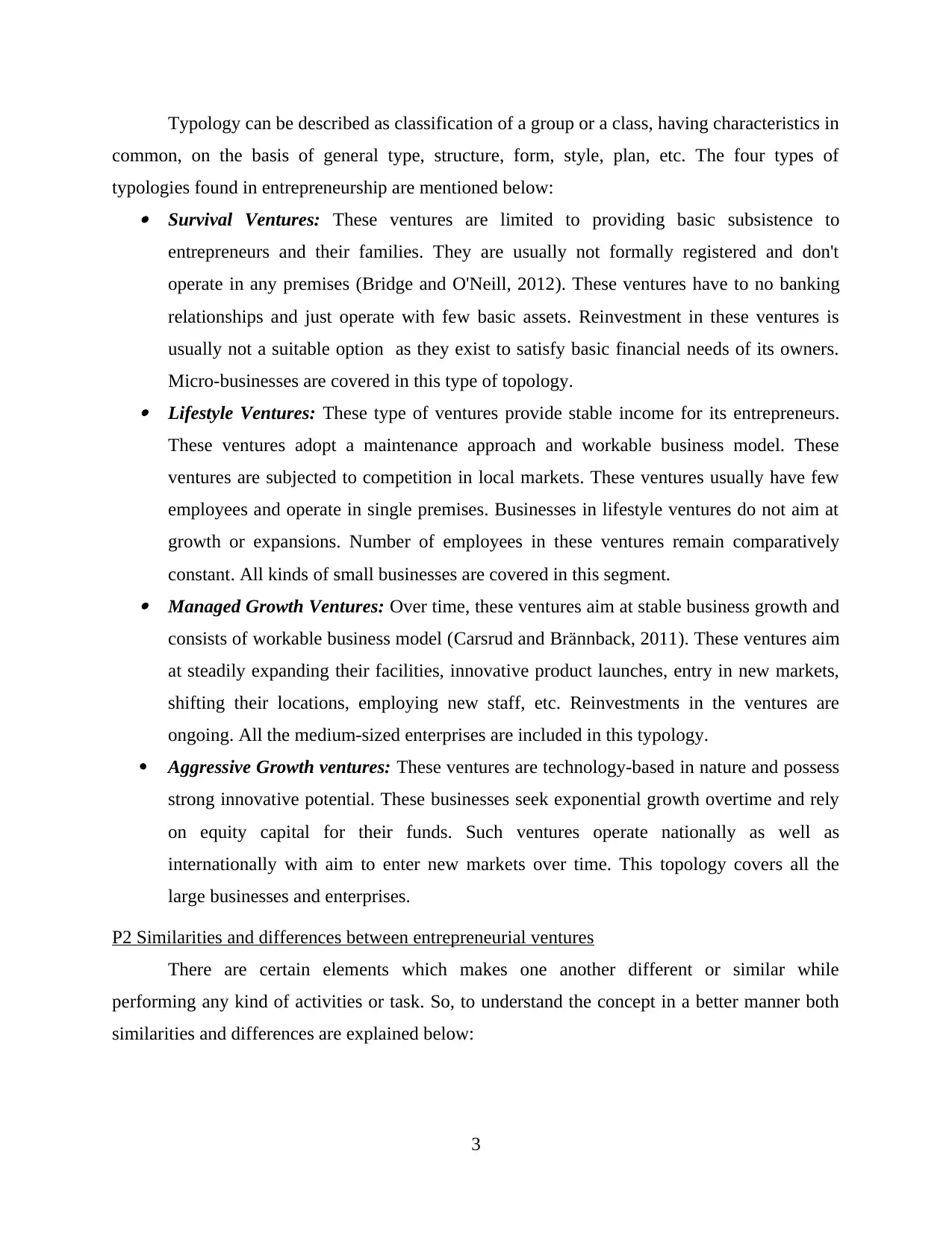
Typology can be described as classification of a group or a class, having characteristics in
common, on the basis of general type, structure, form, style, plan, etc. The four types of
typologies found in entrepreneurship are mentioned below: Survival Ventures: These ventures are limited to providing basic subsistence to
entrepreneurs and their families. They are usually not formally registered and don't
operate in any premises (Bridge and O'Neill, 2012). These ventures have to no banking
relationships and just operate with few basic assets. Reinvestment in these ventures is
usually not a suitable option as they exist to satisfy basic financial needs of its owners.
Micro-businesses are covered in this type of topology. Lifestyle Ventures: These type of ventures provide stable income for its entrepreneurs.
These ventures adopt a maintenance approach and workable business model. These
ventures are subjected to competition in local markets. These ventures usually have few
employees and operate in single premises. Businesses in lifestyle ventures do not aim at
growth or expansions. Number of employees in these ventures remain comparatively
constant. All kinds of small businesses are covered in this segment. Managed Growth Ventures: Over time, these ventures aim at stable business growth and
consists of workable business model (Carsrud and Brännback, 2011). These ventures aim
at steadily expanding their facilities, innovative product launches, entry in new markets,
shifting their locations, employing new staff, etc. Reinvestments in the ventures are
ongoing. All the medium-sized enterprises are included in this typology.
Aggressive Growth ventures: These ventures are technology-based in nature and possess
strong innovative potential. These businesses seek exponential growth overtime and rely
on equity capital for their funds. Such ventures operate nationally as well as
internationally with aim to enter new markets over time. This topology covers all the
large businesses and enterprises.
P2 Similarities and differences between entrepreneurial ventures
There are certain elements which makes one another different or similar while
performing any kind of activities or task. So, to understand the concept in a better manner both
similarities and differences are explained below:
3
common, on the basis of general type, structure, form, style, plan, etc. The four types of
typologies found in entrepreneurship are mentioned below: Survival Ventures: These ventures are limited to providing basic subsistence to
entrepreneurs and their families. They are usually not formally registered and don't
operate in any premises (Bridge and O'Neill, 2012). These ventures have to no banking
relationships and just operate with few basic assets. Reinvestment in these ventures is
usually not a suitable option as they exist to satisfy basic financial needs of its owners.
Micro-businesses are covered in this type of topology. Lifestyle Ventures: These type of ventures provide stable income for its entrepreneurs.
These ventures adopt a maintenance approach and workable business model. These
ventures are subjected to competition in local markets. These ventures usually have few
employees and operate in single premises. Businesses in lifestyle ventures do not aim at
growth or expansions. Number of employees in these ventures remain comparatively
constant. All kinds of small businesses are covered in this segment. Managed Growth Ventures: Over time, these ventures aim at stable business growth and
consists of workable business model (Carsrud and Brännback, 2011). These ventures aim
at steadily expanding their facilities, innovative product launches, entry in new markets,
shifting their locations, employing new staff, etc. Reinvestments in the ventures are
ongoing. All the medium-sized enterprises are included in this typology.
Aggressive Growth ventures: These ventures are technology-based in nature and possess
strong innovative potential. These businesses seek exponential growth overtime and rely
on equity capital for their funds. Such ventures operate nationally as well as
internationally with aim to enter new markets over time. This topology covers all the
large businesses and enterprises.
P2 Similarities and differences between entrepreneurial ventures
There are certain elements which makes one another different or similar while
performing any kind of activities or task. So, to understand the concept in a better manner both
similarities and differences are explained below:
3
⊘ This is a preview!⊘
Do you want full access?
Subscribe today to unlock all pages.

Trusted by 1+ million students worldwide
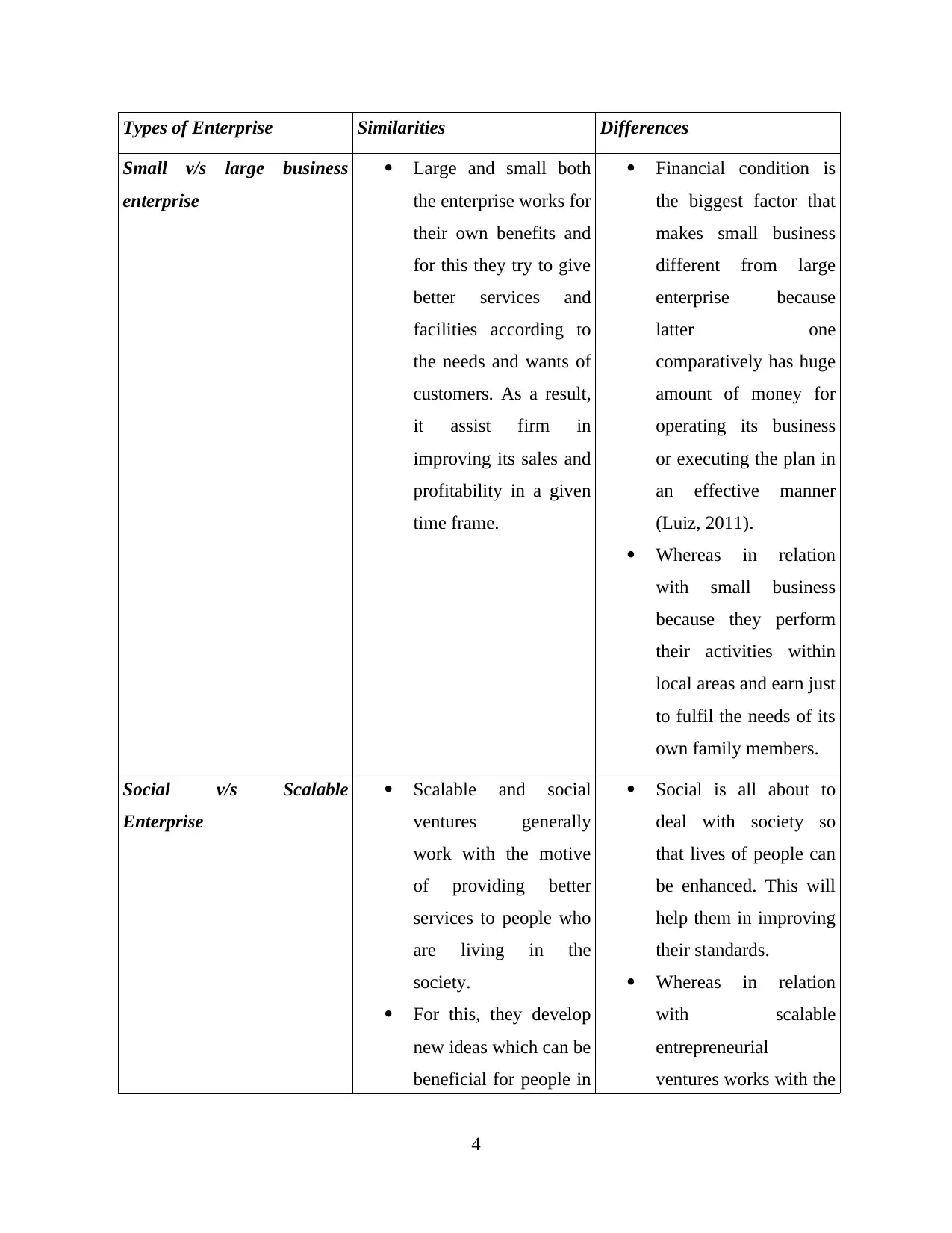
Types of Enterprise Similarities Differences
Small v/s large business
enterprise
Large and small both
the enterprise works for
their own benefits and
for this they try to give
better services and
facilities according to
the needs and wants of
customers. As a result,
it assist firm in
improving its sales and
profitability in a given
time frame.
Financial condition is
the biggest factor that
makes small business
different from large
enterprise because
latter one
comparatively has huge
amount of money for
operating its business
or executing the plan in
an effective manner
(Luiz, 2011).
Whereas in relation
with small business
because they perform
their activities within
local areas and earn just
to fulfil the needs of its
own family members.
Social v/s Scalable
Enterprise
Scalable and social
ventures generally
work with the motive
of providing better
services to people who
are living in the
society.
For this, they develop
new ideas which can be
beneficial for people in
Social is all about to
deal with society so
that lives of people can
be enhanced. This will
help them in improving
their standards.
Whereas in relation
with scalable
entrepreneurial
ventures works with the
4
Small v/s large business
enterprise
Large and small both
the enterprise works for
their own benefits and
for this they try to give
better services and
facilities according to
the needs and wants of
customers. As a result,
it assist firm in
improving its sales and
profitability in a given
time frame.
Financial condition is
the biggest factor that
makes small business
different from large
enterprise because
latter one
comparatively has huge
amount of money for
operating its business
or executing the plan in
an effective manner
(Luiz, 2011).
Whereas in relation
with small business
because they perform
their activities within
local areas and earn just
to fulfil the needs of its
own family members.
Social v/s Scalable
Enterprise
Scalable and social
ventures generally
work with the motive
of providing better
services to people who
are living in the
society.
For this, they develop
new ideas which can be
beneficial for people in
Social is all about to
deal with society so
that lives of people can
be enhanced. This will
help them in improving
their standards.
Whereas in relation
with scalable
entrepreneurial
ventures works with the
4
Paraphrase This Document
Need a fresh take? Get an instant paraphrase of this document with our AI Paraphraser
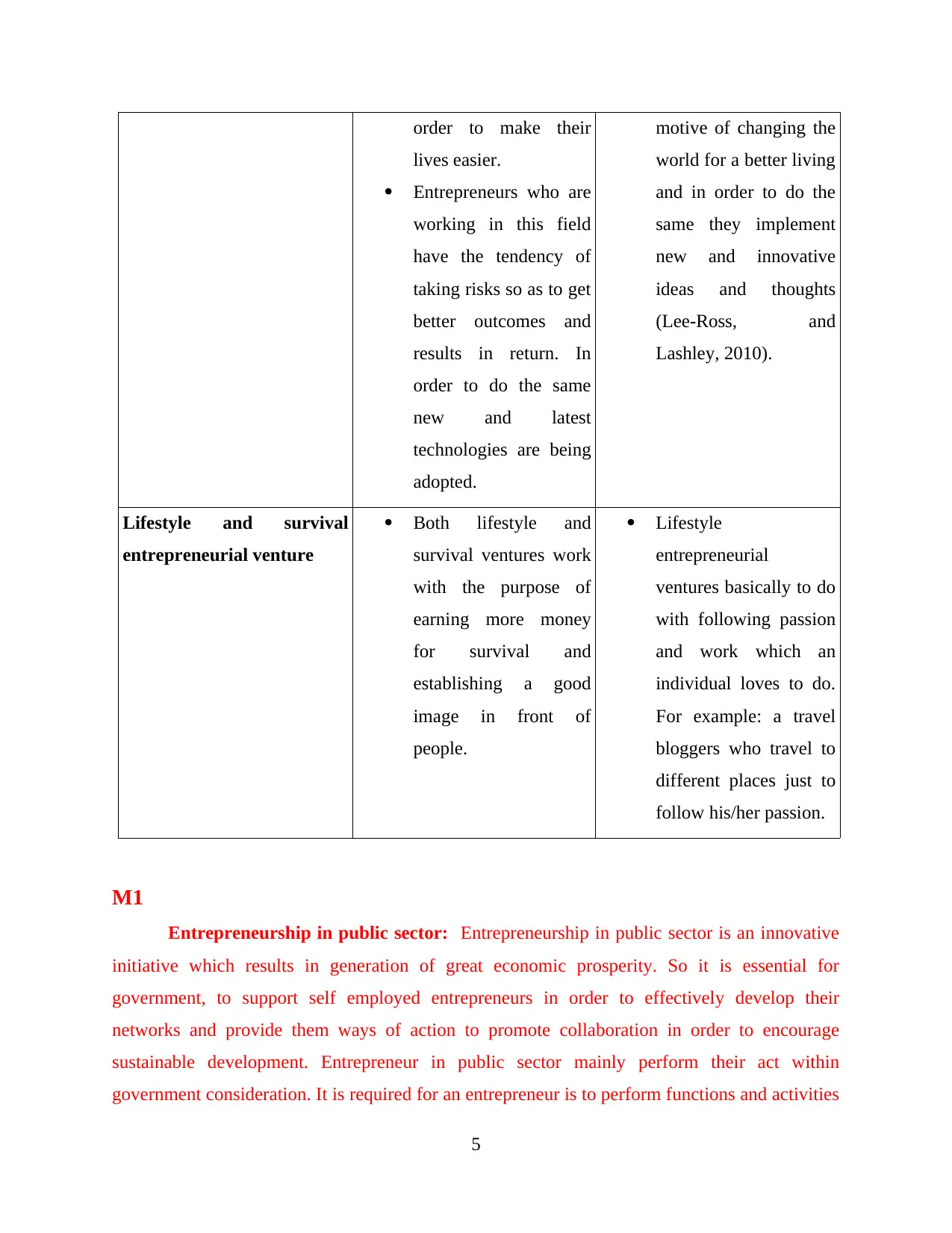
order to make their
lives easier.
Entrepreneurs who are
working in this field
have the tendency of
taking risks so as to get
better outcomes and
results in return. In
order to do the same
new and latest
technologies are being
adopted.
motive of changing the
world for a better living
and in order to do the
same they implement
new and innovative
ideas and thoughts
(Lee-Ross, and
Lashley, 2010).
Lifestyle and survival
entrepreneurial venture
Both lifestyle and
survival ventures work
with the purpose of
earning more money
for survival and
establishing a good
image in front of
people.
Lifestyle
entrepreneurial
ventures basically to do
with following passion
and work which an
individual loves to do.
For example: a travel
bloggers who travel to
different places just to
follow his/her passion.
M1
Entrepreneurship in public sector: Entrepreneurship in public sector is an innovative
initiative which results in generation of great economic prosperity. So it is essential for
government, to support self employed entrepreneurs in order to effectively develop their
networks and provide them ways of action to promote collaboration in order to encourage
sustainable development. Entrepreneur in public sector mainly perform their act within
government consideration. It is required for an entrepreneur is to perform functions and activities
5
lives easier.
Entrepreneurs who are
working in this field
have the tendency of
taking risks so as to get
better outcomes and
results in return. In
order to do the same
new and latest
technologies are being
adopted.
motive of changing the
world for a better living
and in order to do the
same they implement
new and innovative
ideas and thoughts
(Lee-Ross, and
Lashley, 2010).
Lifestyle and survival
entrepreneurial venture
Both lifestyle and
survival ventures work
with the purpose of
earning more money
for survival and
establishing a good
image in front of
people.
Lifestyle
entrepreneurial
ventures basically to do
with following passion
and work which an
individual loves to do.
For example: a travel
bloggers who travel to
different places just to
follow his/her passion.
M1
Entrepreneurship in public sector: Entrepreneurship in public sector is an innovative
initiative which results in generation of great economic prosperity. So it is essential for
government, to support self employed entrepreneurs in order to effectively develop their
networks and provide them ways of action to promote collaboration in order to encourage
sustainable development. Entrepreneur in public sector mainly perform their act within
government consideration. It is required for an entrepreneur is to perform functions and activities
5
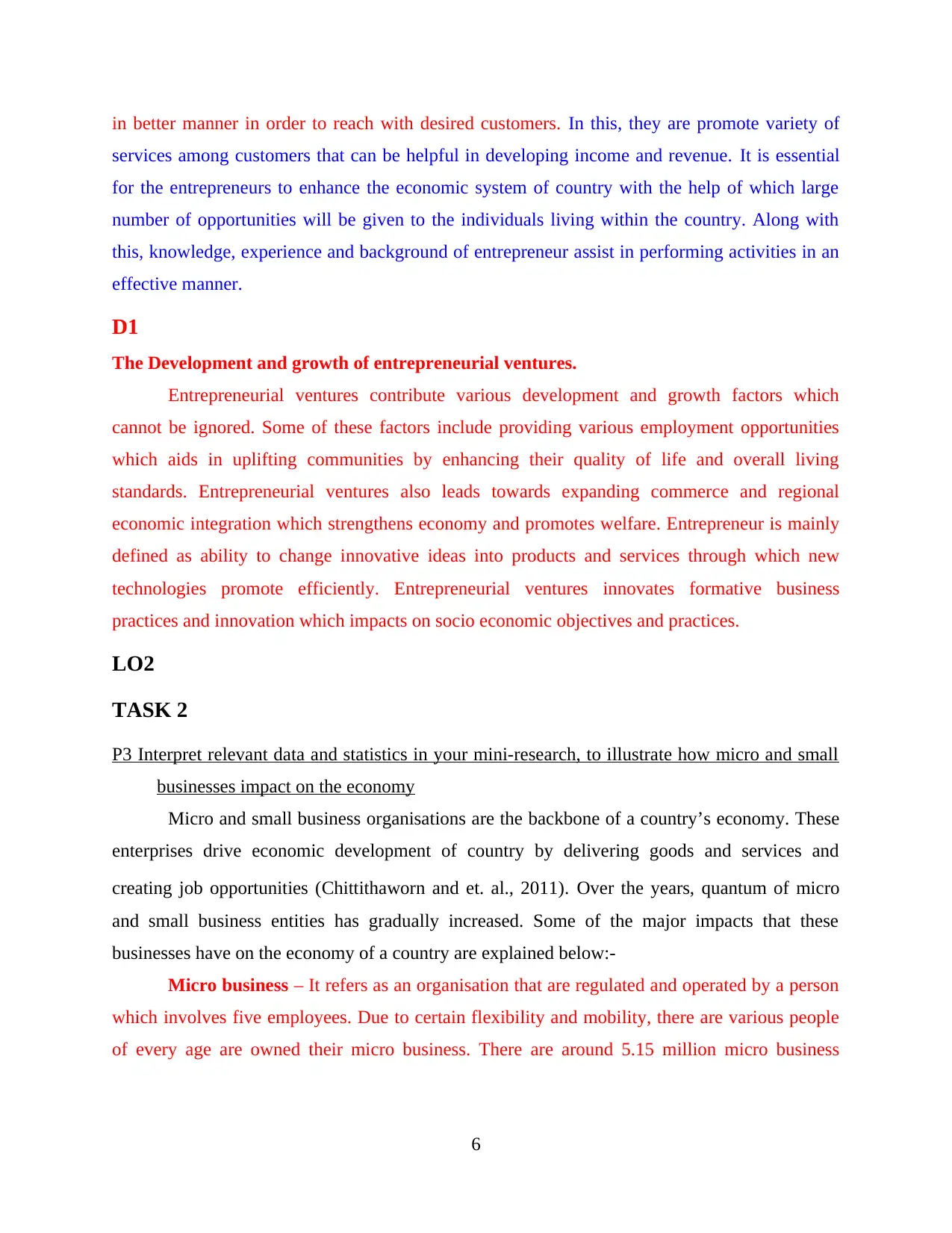
in better manner in order to reach with desired customers. In this, they are promote variety of
services among customers that can be helpful in developing income and revenue. It is essential
for the entrepreneurs to enhance the economic system of country with the help of which large
number of opportunities will be given to the individuals living within the country. Along with
this, knowledge, experience and background of entrepreneur assist in performing activities in an
effective manner.
D1
The Development and growth of entrepreneurial ventures.
Entrepreneurial ventures contribute various development and growth factors which
cannot be ignored. Some of these factors include providing various employment opportunities
which aids in uplifting communities by enhancing their quality of life and overall living
standards. Entrepreneurial ventures also leads towards expanding commerce and regional
economic integration which strengthens economy and promotes welfare. Entrepreneur is mainly
defined as ability to change innovative ideas into products and services through which new
technologies promote efficiently. Entrepreneurial ventures innovates formative business
practices and innovation which impacts on socio economic objectives and practices.
LO2
TASK 2
P3 Interpret relevant data and statistics in your mini-research, to illustrate how micro and small
businesses impact on the economy
Micro and small business organisations are the backbone of a country’s economy. These
enterprises drive economic development of country by delivering goods and services and
creating job opportunities (Chittithaworn and et. al., 2011). Over the years, quantum of micro
and small business entities has gradually increased. Some of the major impacts that these
businesses have on the economy of a country are explained below:-
Micro business – It refers as an organisation that are regulated and operated by a person
which involves five employees. Due to certain flexibility and mobility, there are various people
of every age are owned their micro business. There are around 5.15 million micro business
6
services among customers that can be helpful in developing income and revenue. It is essential
for the entrepreneurs to enhance the economic system of country with the help of which large
number of opportunities will be given to the individuals living within the country. Along with
this, knowledge, experience and background of entrepreneur assist in performing activities in an
effective manner.
D1
The Development and growth of entrepreneurial ventures.
Entrepreneurial ventures contribute various development and growth factors which
cannot be ignored. Some of these factors include providing various employment opportunities
which aids in uplifting communities by enhancing their quality of life and overall living
standards. Entrepreneurial ventures also leads towards expanding commerce and regional
economic integration which strengthens economy and promotes welfare. Entrepreneur is mainly
defined as ability to change innovative ideas into products and services through which new
technologies promote efficiently. Entrepreneurial ventures innovates formative business
practices and innovation which impacts on socio economic objectives and practices.
LO2
TASK 2
P3 Interpret relevant data and statistics in your mini-research, to illustrate how micro and small
businesses impact on the economy
Micro and small business organisations are the backbone of a country’s economy. These
enterprises drive economic development of country by delivering goods and services and
creating job opportunities (Chittithaworn and et. al., 2011). Over the years, quantum of micro
and small business entities has gradually increased. Some of the major impacts that these
businesses have on the economy of a country are explained below:-
Micro business – It refers as an organisation that are regulated and operated by a person
which involves five employees. Due to certain flexibility and mobility, there are various people
of every age are owned their micro business. There are around 5.15 million micro business
6
⊘ This is a preview!⊘
Do you want full access?
Subscribe today to unlock all pages.

Trusted by 1+ million students worldwide
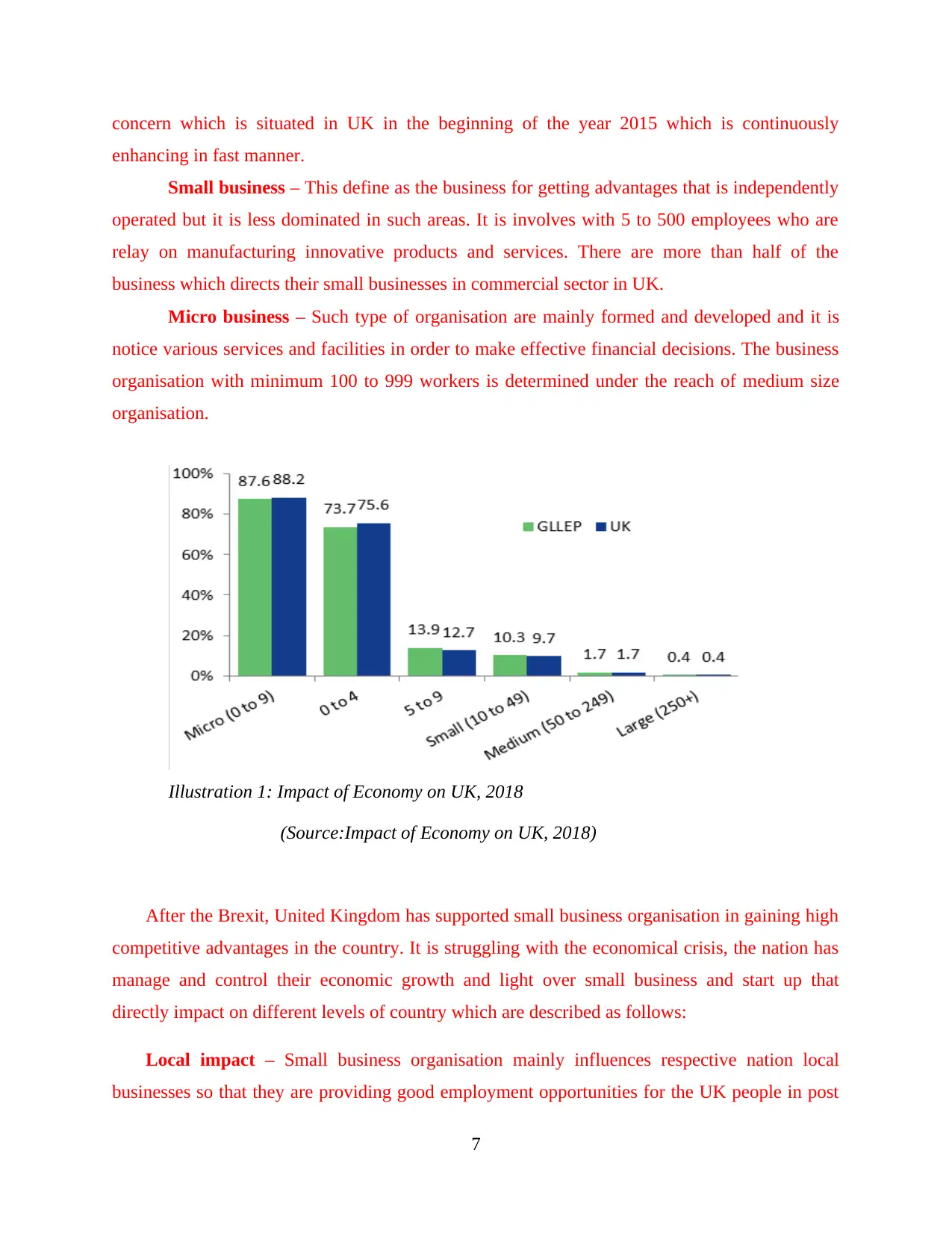
concern which is situated in UK in the beginning of the year 2015 which is continuously
enhancing in fast manner.
Small business – This define as the business for getting advantages that is independently
operated but it is less dominated in such areas. It is involves with 5 to 500 employees who are
relay on manufacturing innovative products and services. There are more than half of the
business which directs their small businesses in commercial sector in UK.
Micro business – Such type of organisation are mainly formed and developed and it is
notice various services and facilities in order to make effective financial decisions. The business
organisation with minimum 100 to 999 workers is determined under the reach of medium size
organisation.
After the Brexit, United Kingdom has supported small business organisation in gaining high
competitive advantages in the country. It is struggling with the economical crisis, the nation has
manage and control their economic growth and light over small business and start up that
directly impact on different levels of country which are described as follows:
Local impact – Small business organisation mainly influences respective nation local
businesses so that they are providing good employment opportunities for the UK people in post
7
Illustration 1: Impact of Economy on UK, 2018
(Source:Impact of Economy on UK, 2018)
enhancing in fast manner.
Small business – This define as the business for getting advantages that is independently
operated but it is less dominated in such areas. It is involves with 5 to 500 employees who are
relay on manufacturing innovative products and services. There are more than half of the
business which directs their small businesses in commercial sector in UK.
Micro business – Such type of organisation are mainly formed and developed and it is
notice various services and facilities in order to make effective financial decisions. The business
organisation with minimum 100 to 999 workers is determined under the reach of medium size
organisation.
After the Brexit, United Kingdom has supported small business organisation in gaining high
competitive advantages in the country. It is struggling with the economical crisis, the nation has
manage and control their economic growth and light over small business and start up that
directly impact on different levels of country which are described as follows:
Local impact – Small business organisation mainly influences respective nation local
businesses so that they are providing good employment opportunities for the UK people in post
7
Illustration 1: Impact of Economy on UK, 2018
(Source:Impact of Economy on UK, 2018)
Paraphrase This Document
Need a fresh take? Get an instant paraphrase of this document with our AI Paraphraser
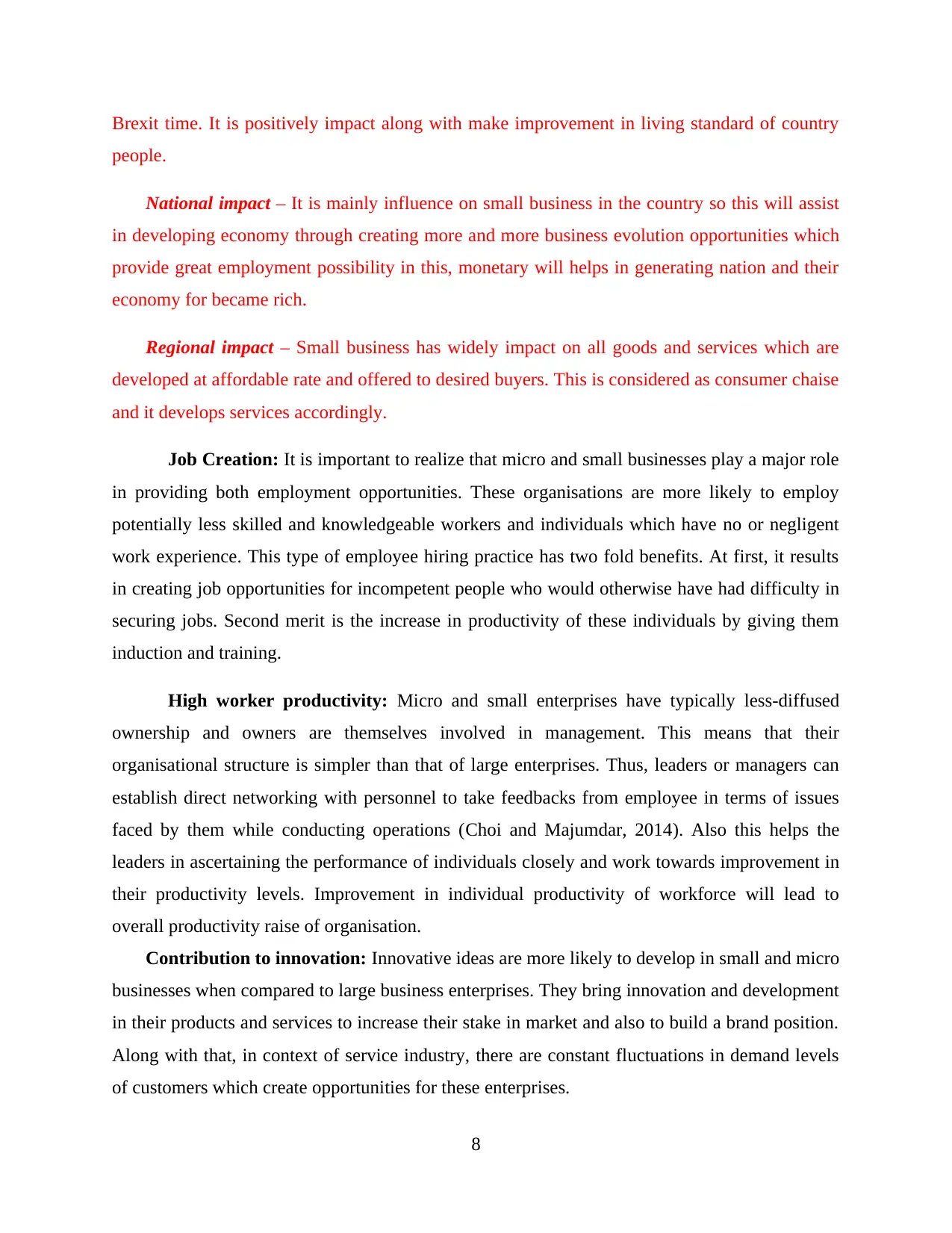
Brexit time. It is positively impact along with make improvement in living standard of country
people.
National impact – It is mainly influence on small business in the country so this will assist
in developing economy through creating more and more business evolution opportunities which
provide great employment possibility in this, monetary will helps in generating nation and their
economy for became rich.
Regional impact – Small business has widely impact on all goods and services which are
developed at affordable rate and offered to desired buyers. This is considered as consumer chaise
and it develops services accordingly.
Job Creation: It is important to realize that micro and small businesses play a major role
in providing both employment opportunities. These organisations are more likely to employ
potentially less skilled and knowledgeable workers and individuals which have no or negligent
work experience. This type of employee hiring practice has two fold benefits. At first, it results
in creating job opportunities for incompetent people who would otherwise have had difficulty in
securing jobs. Second merit is the increase in productivity of these individuals by giving them
induction and training.
High worker productivity: Micro and small enterprises have typically less-diffused
ownership and owners are themselves involved in management. This means that their
organisational structure is simpler than that of large enterprises. Thus, leaders or managers can
establish direct networking with personnel to take feedbacks from employee in terms of issues
faced by them while conducting operations (Choi and Majumdar, 2014). Also this helps the
leaders in ascertaining the performance of individuals closely and work towards improvement in
their productivity levels. Improvement in individual productivity of workforce will lead to
overall productivity raise of organisation.
Contribution to innovation: Innovative ideas are more likely to develop in small and micro
businesses when compared to large business enterprises. They bring innovation and development
in their products and services to increase their stake in market and also to build a brand position.
Along with that, in context of service industry, there are constant fluctuations in demand levels
of customers which create opportunities for these enterprises.
8
people.
National impact – It is mainly influence on small business in the country so this will assist
in developing economy through creating more and more business evolution opportunities which
provide great employment possibility in this, monetary will helps in generating nation and their
economy for became rich.
Regional impact – Small business has widely impact on all goods and services which are
developed at affordable rate and offered to desired buyers. This is considered as consumer chaise
and it develops services accordingly.
Job Creation: It is important to realize that micro and small businesses play a major role
in providing both employment opportunities. These organisations are more likely to employ
potentially less skilled and knowledgeable workers and individuals which have no or negligent
work experience. This type of employee hiring practice has two fold benefits. At first, it results
in creating job opportunities for incompetent people who would otherwise have had difficulty in
securing jobs. Second merit is the increase in productivity of these individuals by giving them
induction and training.
High worker productivity: Micro and small enterprises have typically less-diffused
ownership and owners are themselves involved in management. This means that their
organisational structure is simpler than that of large enterprises. Thus, leaders or managers can
establish direct networking with personnel to take feedbacks from employee in terms of issues
faced by them while conducting operations (Choi and Majumdar, 2014). Also this helps the
leaders in ascertaining the performance of individuals closely and work towards improvement in
their productivity levels. Improvement in individual productivity of workforce will lead to
overall productivity raise of organisation.
Contribution to innovation: Innovative ideas are more likely to develop in small and micro
businesses when compared to large business enterprises. They bring innovation and development
in their products and services to increase their stake in market and also to build a brand position.
Along with that, in context of service industry, there are constant fluctuations in demand levels
of customers which create opportunities for these enterprises.
8
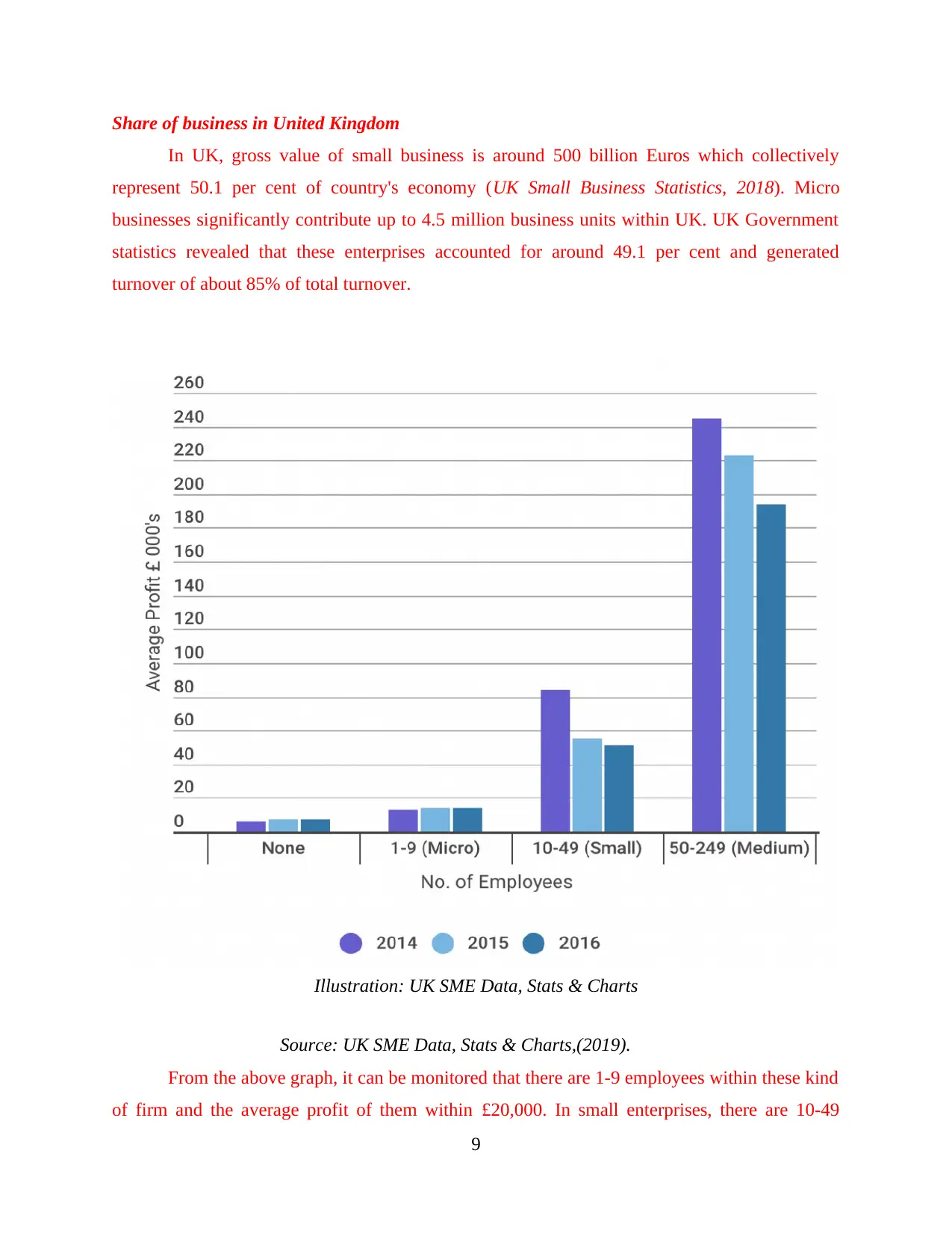
Share of business in United Kingdom
In UK, gross value of small business is around 500 billion Euros which collectively
represent 50.1 per cent of country's economy (UK Small Business Statistics, 2018). Micro
businesses significantly contribute up to 4.5 million business units within UK. UK Government
statistics revealed that these enterprises accounted for around 49.1 per cent and generated
turnover of about 85% of total turnover.
Source: UK SME Data, Stats & Charts,(2019).
From the above graph, it can be monitored that there are 1-9 employees within these kind
of firm and the average profit of them within £20,000. In small enterprises, there are 10-49
9
Illustration: UK SME Data, Stats & Charts
In UK, gross value of small business is around 500 billion Euros which collectively
represent 50.1 per cent of country's economy (UK Small Business Statistics, 2018). Micro
businesses significantly contribute up to 4.5 million business units within UK. UK Government
statistics revealed that these enterprises accounted for around 49.1 per cent and generated
turnover of about 85% of total turnover.
Source: UK SME Data, Stats & Charts,(2019).
From the above graph, it can be monitored that there are 1-9 employees within these kind
of firm and the average profit of them within £20,000. In small enterprises, there are 10-49
9
Illustration: UK SME Data, Stats & Charts
⊘ This is a preview!⊘
Do you want full access?
Subscribe today to unlock all pages.

Trusted by 1+ million students worldwide
1 out of 22
Related Documents
Your All-in-One AI-Powered Toolkit for Academic Success.
+13062052269
info@desklib.com
Available 24*7 on WhatsApp / Email
![[object Object]](/_next/static/media/star-bottom.7253800d.svg)
Unlock your academic potential
Copyright © 2020–2025 A2Z Services. All Rights Reserved. Developed and managed by ZUCOL.





